© 2024 ALLCITY Network Inc.
All rights reserved.

DENVER — This was supposed to be Paxton Lynch’s big opportunity, his true NFL audition and in the blink of an eye, it was gone. Lynch’s path to arrive at this place has been a true disappointment, highlighted by losing two quarterback battles to Trevor Siemian and three unconvincing (to say the least) starts.
His injuries this season have only made things worse and, all of the sudden, it seems as if the long-term raw talented developmental project is ready to be scrapped.
Whether that’ll be Lynch’s ultimate fate with the Denver Broncos or not, he’s not the only one that’s guilty in this whole ordeal as an offense around Lynch was never built to help him, whether that be in scheme or talent around him.
With his start this past Sunday against the Oakland Raiders as our example, we’re going to get into what went wrong in scheme and execution in this one.
Paxton doesn’t help his case
Lynch never quite got going in this game, and the play calls early on were there for him to feel comfortable and let his talents shine.
His very first pass was in shotgun out of a perfect spread look with Emmanuel Sanders and Demaryius Thomas running underneath routes and the two outside receivers going deep. Lynch had Bennie Fowler outside the numbers to his arm side, with no help over the top and with Fowler beating his man in single coverage. Lynch saw him and let it rip. Only thing is the pass was overthrown.
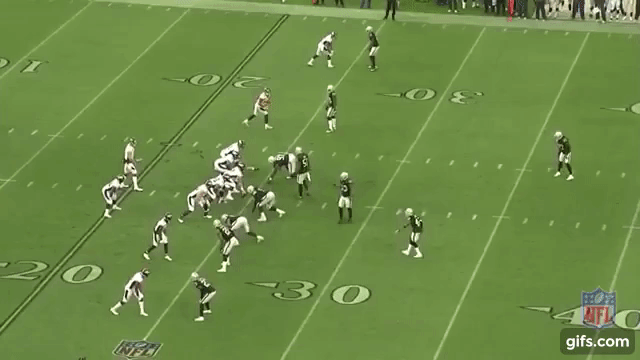
It’s hard to say off of one pass but, in many ways, that throw was emblematic of the entire game, Lynch just didn’t seem confident. A chance like that is one that a quarterback should relish with a receiver streaking downfield on his very first pass. Instead of going out there to make plays Lynch seemed more concerned with avoiding mistakes, he just didn’t look loose, and that continued for most of the game.
No. 12 seemed locked in on his first read, too, missing a few open targets. A part of the issue is that Lynch doesn’t seem to be reading coverages pre-snap, allowing him to already dictate where he should go. Instead, he’s trying to play mistake free, almost conservative, going to his first read and trying to stay safe.
Of course, that got him in trouble in the red zone, where he locked onto Virgil Green, trying to make a tough throw on the run. Lynch is talented and has made plays like this before, but trying to flip his hips mid-air as he’s running full stride was too much as his ball placement was off and behind, leading to a costly interception. Knowing when to and when not to take his shots is something that all the quarterbacks on the roster have struggled with.
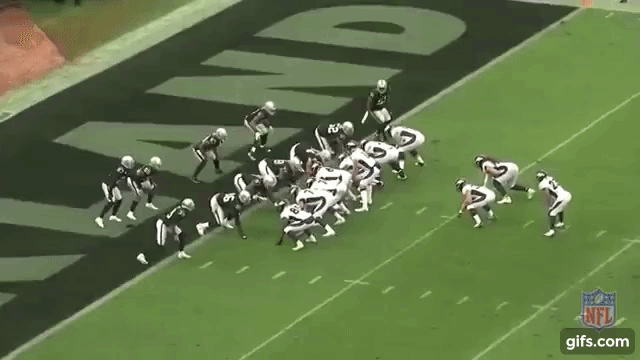
While in the pocket, the progression in his lower body mechanics still isn’t fully developed and it’s a big reason why he’s such an erratic passer. A bounced pass to Sanders was a perfect example of this, and it’s why regardless of the protection he had—which was often good—he just wasn’t able to get into a groove.
When protection wasn’t great, Lynch wasn’t reading unblocked blitzes pre-snap to make a play against pressure. He also wasn’t showing good poise or maneuvering, which again is related to footwork that fails him at times. His processing speed also hasn’t been great or sped up much. He just isn’t ripping it, he’s missing that quick trigger, and it looks like he’s still trying to wait for guys to come open instead of throwing them open.
There were a few positives to note as well, first of all being his ability as a runner. If healthy, even on special packages, Lynch can have an impact as a running quarterback, but he wasn’t drafted in the first round—with the Broncos trading a third-round pick to move up—so that he could be a special-package, glorified wildcat quarterback. Lynch was highly touted because of his arm.
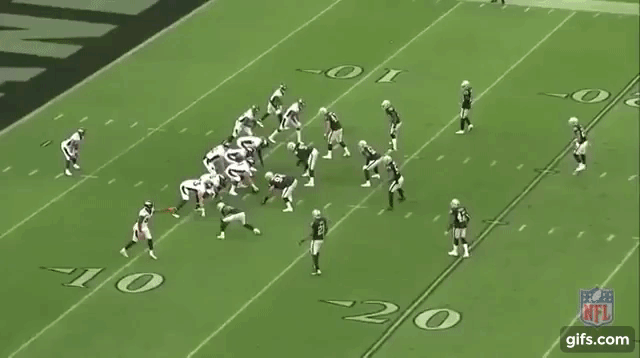
By far Paxton’s best pass of the game was a dime to Devontae Booker, threading the needle and leading his receiver perfectly with some splendid touch. The completion to Booker was one of the few where Paxton actually worked off of his first read and took advantage of good protection. He showed the confidence to want to make the play, there just wasn’t nearly enough of that to install any confidence in his ability to develop.
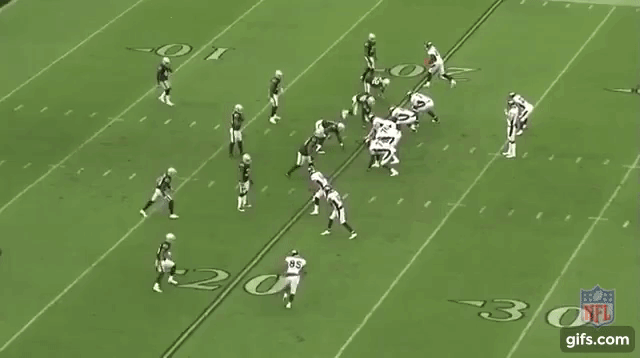
Paxton likely had his worst game as a passer in his four appearances in the regular season as a professional, with completions hard to come by and his confidence truly seeming to lack entirely.
Scheme helps, execution doesn’t
In re-watching the game, it was clear, especially in the early going, that the Broncos did their best to make Lynch comfortable and exploit his strengths. He was given spread looks with extra protection out of the backfield. He was offered up easy screens to get him in rhythm and get going. The Broncos had play-action looks and even a rare read-option with Booker in motion to the opposite side.
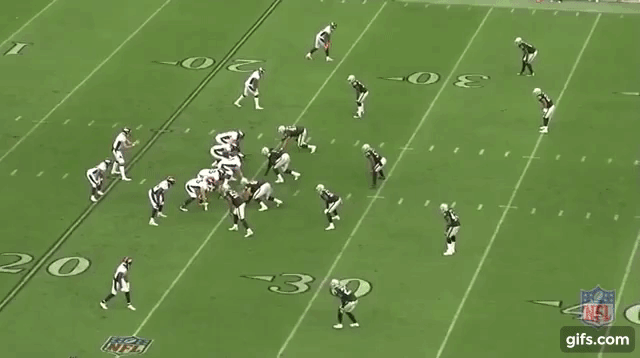
Denver even got creative, putting nose tackle Domata Peko in as a fullback in their goal-line package.
As far as the personnel went, the protection was fairly good early on, but there was too much pressure allowed on the inside and Lynch had no chance on the strip sack as Garett Bolles was beaten off the edge in the blink of an eye by Bruce Irvin.
More so than protection, the All-22 tape showed that there really wasn’t much separation being created by Denver’s tight ends or receivers, which comes back to Paxton waiting for receivers to come open instead of throwing them open.
What it all means?
Ultimately, it was quite clear that, at least schematically, new Broncos offensive coordinator Bill Musgrave did a good amount to help Lynch. Once the early scripted plays they implemented for him didn’t work, it’s hard for the play caller to know what’s worth calling again and what isn’t, but they kept things simple, catering to his strengths. As far as execution from his teammates, the performance wasn’t ideal as his receivers and line didn’t make enough plays.
With that said, Paxton’s performance just wasn’t enough. There hasn’t been just about any improvement from his time as a rookie, as he’s regressed in areas and his playmaking swagger has all but disappeared. It was never going to happen in a short amount of time for Paxton, but on plays designed for him to succeed, he can’t miss open throws, be inaccurate on the run or miss open receivers. Certain mistakes can be chalked up to inexperience and needed development, others just aren’t acceptable at this level.
It could be argued that there are at least a handful of teams that have adjusted their offenses to young quarterbacks in which Lynch would have succeeded more so than he has in Denver so far, but the Raiders game showed that it’s not just scheme or circumstances. Paxton looks lost in his development, almost shy on the field, not the same joyful, wild talent who could pull big-time throws out of his hat, or the playmaker that took the Memphis Tigers from unknowns to ranked.
There are many places for blame, and some are just circumstance, but if Paxton just had his final opportunity in Denver, his play will be what haunts him most of all, not any outside factor.
Comments
Share your thoughts
Join the conversation



